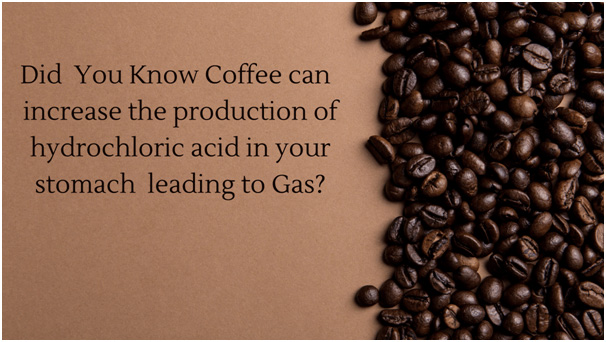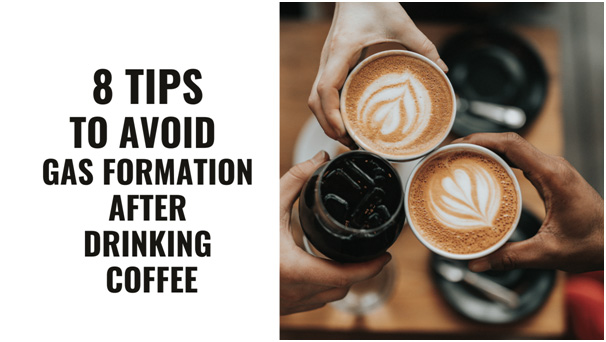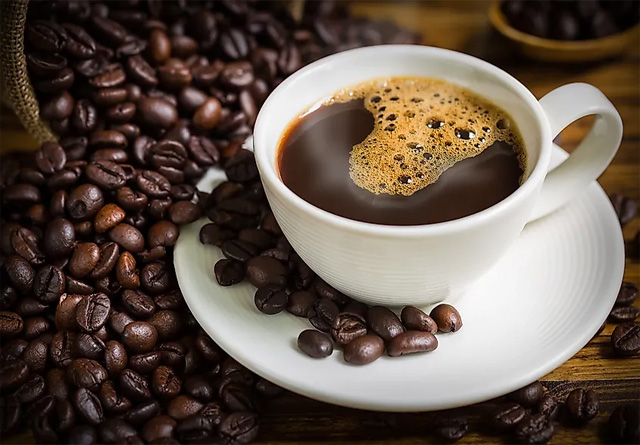Coffee is a staple of life for many people. If left unchecked, it can affect your health. Some researchers suspect coffee causes gas in your digestive system. When this happens, you could experience a number of unpleasant side effects.In this article, we will share some tips to help you avoid the side effects associated with drinking coffee more often. But first, we’re going to look at how coffee affects digestion and your body’s digestive system specifically.
How Does Coffee Affect Your Digestive System?

Caffeine tends to increase stomach acid levels in the body. This boosts stomach acid secretion and can increase pain during acid reflux or heartburn. People tend to consume more acidic foods when they’re feeling stressed or anxious, and caffeine can cause this stress or anxiety in many people.So, it’s entirely possible that the caffeine in coffee could be to blame for your heartburn pain. If you’re experiencing frequent heartburn after drinking coffee or consuming other acidic foods and drinks, try taking a break from caffeine and acidic foods and beverages to see if this reduces or eliminates your heartburn symptoms.
It’s common for people to consume coffee in the morning to get them going or to keep them going throughout the day. However, if you drink too much caffeine, your digestive system may not work as efficiently as it should. Coffee increases the production of hydrochloric acid in your stomach and this can lead to indigestion and gas after drinking coffee. Studies have also suggested that people who suffer from IBS may experience increased symptoms after consuming coffee.If you’re experiencing frequent indigestion or bloating after drinking coffee or after consuming other caffeinated beverages, talk to your doctor about your options. They may be able to offer you some suggestions to help you manage these symptoms. While coffee itself may not be the cause of your symptoms, your doctor may be able to suggest alternatives that you can enjoy without experiencing side effects from caffeine consumption.
You may also like: Does Coffee Cause Bloating? What You Can Do Without Giving Up Coffee Totally
How To Avoid Gas From Drinking Coffee?

Fortunately, there are some steps you can take to reduce the side effects of drinking coffee more often.
Try these tips to help reduce your symptoms to start feeling better after drinking coffee:
- Drink water after drinking coffee: While coffee does contain some water, it’s not a good idea to drink too much coffee in one sitting. This can lead to dehydration and may cause you to feel nauseous following a big coffee binge. Try drinking a glass of water after drinking coffee to help reduce the side effects associated with this habit.
- Don’t drink coffee on an empty stomach: While it’s tempting to drink several cups of coffee in the morning to get the day started or to keep your energy up throughout the day, this can lead to some unpleasant side effects, including acid reflux and indigestion. It’s best to wait a few hours before drinking another cup of coffee after drinking too much coffee on an empty stomach.
- Don’t drink too much coffee: The more you drink, the more symptoms you’ll experience. Try to limit your coffee consumption to one or two cups per day at most (ideally one) to reduce side effects and to manage your heartburn symptoms.
- Limit the consumption of acidic foods and beverages: Many people turn to coffee for an energy boost to help them stay awake throughout the day or to help them make it through their day without any negative effects. However, if you consume more acidic foods and beverages than is recommended, it could lead to heartburn and other side effects.
Try to limit your consumption of acidic foods and drinks to reduce heartburn and indigestion symptoms (once you cut out caffeine from your diet).
- Avoid combining coffee with alcohol: The combination of alcohol and coffee can lead to increased side effects and can make symptoms worse. It’s best to avoid drinking alcohol after two cups of regular coffee and to alternate between alcohol-free days and drinking days to reduce your symptoms and avoid side effects from excessive alcohol consumption and excessive coffee consumption.
- Try to limit your coffee consumption to one or two cups per day: While you may want to drink coffee throughout the day, it’s best to limit your coffee consumption to one or two cups per day to help reduce side effects and to avoid mixing too much caffeine with alcohol.
- Drink decaf: If you don’t want to lose the ability to drink coffee but want to reduce your consumption of caffeine, you might want to try drinking decaf instead. This will help you reduce the consumption of caffeine but still allow you to enjoy the benefits that coffee has to offer.
- Try different coffee blends: Coffee blends vary and you may find that some blends lead to different side effects than others. For this reason, it’s a good idea to try different blends to find the one that’s best for you and your preferences.
Can Coffee Cause Constipation?
Yes and no. Coffee itself does not cause constipation but can potentially increase your risk for constipation if consumed in larger quantities than recommended or if you drink too much of it in one sitting.It’s also important to avoid consuming large amounts of coffee on an empty stomach because this can disrupt your digestion process and lead to constipation.
If you’re having trouble getting regular bowel movements, try drinking less coffee to see if this helps to improve your regularity.
If you continue to experience difficulty getting regular bowel movements or are experiencing significant bloating or cramping after drinking coffee, talk to your doctor about other potential causes for these symptoms and what you can do to reduce these symptoms.
If you have IBS and drink coffee too frequently, you could experience more symptoms of IBS than usual and increase your risk for constipation and other symptoms associated with IBS.
Conclusion: Can Coffee Cause Gas?
As we’ve discussed throughout this article, coffee has the potential to cause gas and increase your risk for heartburn and indigestion. It can also increase your risk for constipation if you drink too much coffee in one sitting or if you suffer from IBS and drink too much coffee regularly. If you experience frequent gas and bloating after drinking coffee, try reducing the amount of coffee you drink and drink water after you take coffee to reduce your risk for side effects from excessive caffeine consumption.
Also, try to eat smaller meals and reduce your consumption of acidic foods and beverages, including coffee, to reduce your risk for side effects from these habits as well. If you’re still struggling with gas and bloating after consuming coffee, talk to your doctor about other potential causes for your symptoms and what you can do to reduce your symptoms after drinking coffee.




